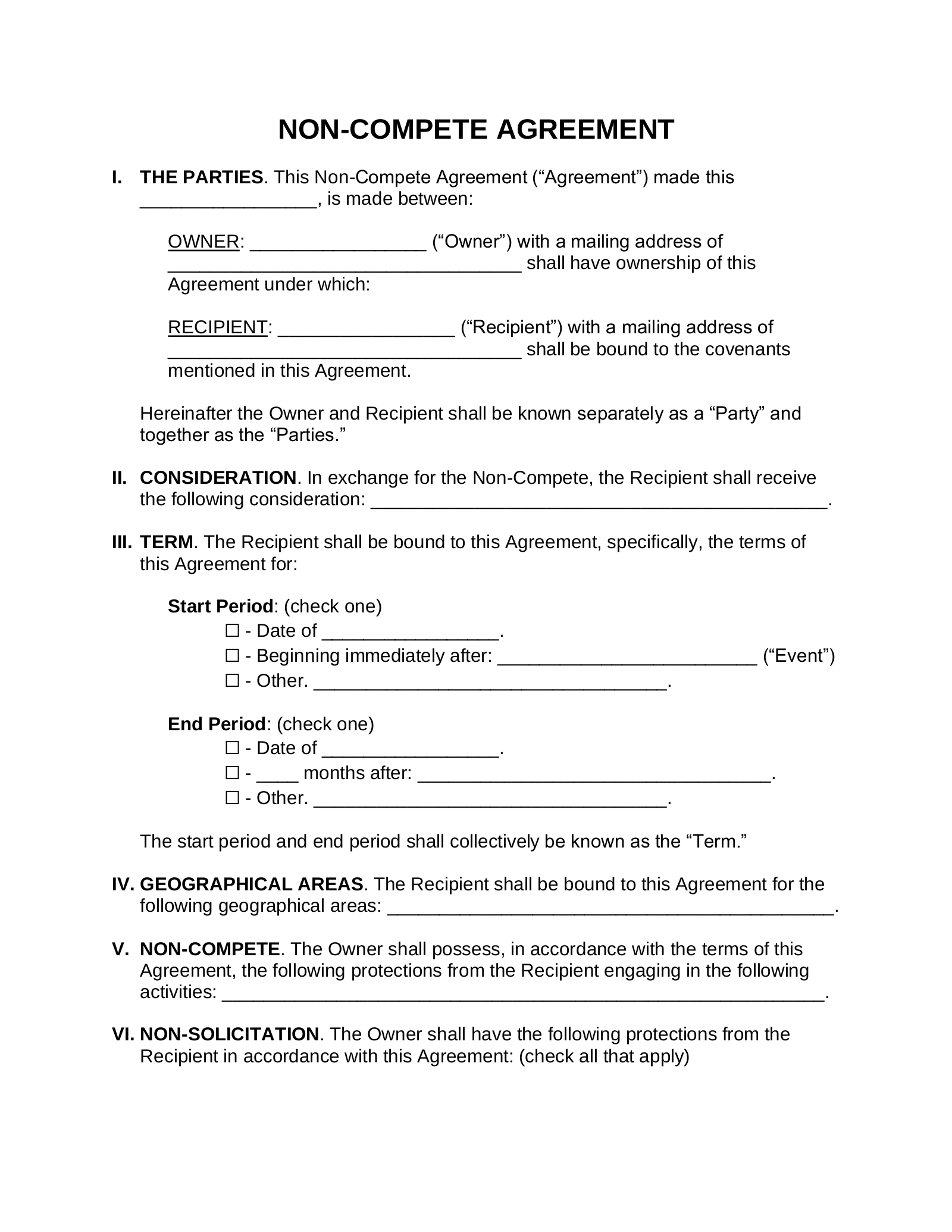
Noncompetition agreements, also known as non-compete clauses or restrictive covenants, have become a common practice in the business world. These agreements are designed to protect a company’s proprietary information, trade secrets, and customer relationships from being exploited by former employees or business partners.
In this article, we will explore the purpose and benefits of non-competition agreements, as well as the key elements that should be included in such agreements.
What is a Non-Competition Agreement?
A noncompetition agreement is a legally binding contract between two parties, typically an employer and an employee or a business owner and a business partner. This agreement prohibits the employee or business partner from engaging in activities that compete with the employer or business owner for a certain period and within a specific geographical area. The purpose of this agreement is to prevent the employee or business partner from using the knowledge, skills, and contacts gained during their employment or partnership to set up a competing business or work for a competitor.
Why Should Businesses Implement Non-Competition Agreements?
Non-competition agreements provide several benefits for businesses:
- Protection of Trade Secrets and Proprietary Information: By signing a non competition agreement, employees and business partners are legally bound to keep confidential information protected. This helps businesses safeguard their trade secrets, customer lists, marketing strategies, and other sensitive information.
- Preservation of Customer Relationships: Non competition agreements prevent employees and business partners from soliciting or servicing the company’s customers for a certain time after their employment or partnership ends. This ensures that valuable customer relationships remain intact and prevents the loss of business opportunities.
- Maintaining Competitive Advantage: Non competition agreements help businesses maintain their competitive edge by preventing former employees or business partners from using their knowledge and experience to gain an unfair advantage in the market. This allows companies to continue innovating and growing without fear of immediate competition.
- Attracting Investors and Buyers: Having non competition agreements in place can make a business more attractive to potential investors or buyers. These agreements provide reassurance that key employees or business partners will not leave and set up competing ventures, thus protecting the value of the business.
When Should Non Competition Agreements Be Used?
Non competition agreements are commonly used in the following situations:
- Employment Contracts: Employers often include non competition clauses in employment contracts to prevent employees from joining competitors or starting their own competing businesses during or after their employment.
- Partnership Agreements: Business partners may include non competition clauses in their partnership agreements to ensure that if one partner leaves the business, they cannot immediately set up a competing venture using the knowledge and contacts gained during their partnership.
- Business Sales and Acquisitions: When selling or acquiring a business, non competition agreements are commonly used to protect the value of the business by preventing the seller or key employees from competing with the new owner.
Key Considerations for Non Competition Agreements
When drafting a non competition agreement, it is important to consider the following key elements:
- Scope of the Agreement: Clearly define the activities that are restricted by the agreement. This includes specifying the type of business or industry that is considered a direct competitor.
- Duration: Determine the length of time the restrictions will be in effect. The duration should be reasonable and justifiable based on the nature of the business and the employee’s or partner’s role.
- Geographical Limitations: Specify the geographic area where the restrictions apply. This can range from a specific city or state to a broader regional or national scope.
- Consideration: Non competition agreements must be supported by consideration, which is something of value given by one party to the other. This can include employment, access to proprietary information, or financial compensation.
- Enforceability: Non competition agreements must be reasonable in scope, duration, and geographic limitations to be enforceable. It is important to consult with legal professionals to ensure that the agreement is valid and compliant with local laws.




The Benefits of Non Competition Agreements
Non competition agreements provide businesses with the necessary tools to protect their intellectual property, customer relationships, and competitive advantage. By implementing these agreements, companies can safeguard their interests and maintain a strong position in the market. Whether it is through employment contracts, partnership agreements, or business sales and acquisitions, non competition agreements play a crucial role in securing the long-term success of businesses.
- Protection of intellectual property and trade secrets. Non competition agreements help businesses protect their valuable intellectual property, trade secrets, and confidential information from being exploited by former employees or business partners.
- Preservation of customer relationships. By preventing employees or business partners from soliciting or servicing the company’s customers, non competition agreements ensure that valuable customer relationships remain intact and prevent the loss of business opportunities.
- Maintaining a competitive advantage. Non competition agreements allow businesses to maintain their competitive edge by preventing former employees or business partners from using their knowledge and experience to gain an unfair advantage in the market.
- Attracting investors and buyers. Having non competition agreements in place can make a business more attractive to potential investors or buyers, as it provides reassurance that key employees or business partners will not leave and set up competing ventures.
- Ensuring long-term success. Non competition agreements play a crucial role in securing the long-term success of businesses by protecting their interests and maintaining a strong position in the market.
Final Words
Non-competition agreements are an essential tool for businesses to protect their intellectual property, customer relationships, and competitive advantage. By implementing these agreements, companies can safeguard their interests and maintain a strong position in the market. Whether it is through employment contracts, partnership agreements, or business sales and acquisitions, non competition agreements play a crucial role in securing the long-term success of businesses.
Non-competition Agreement Template – Word